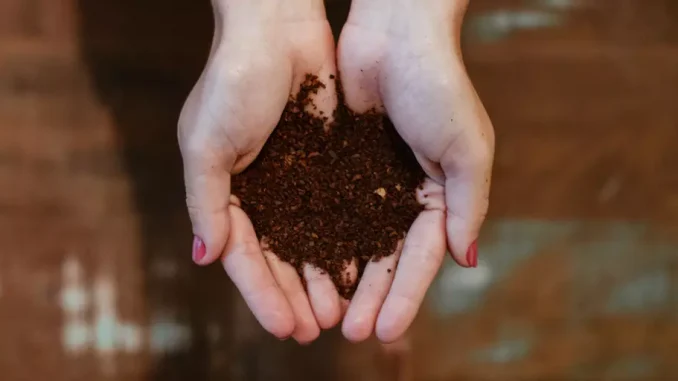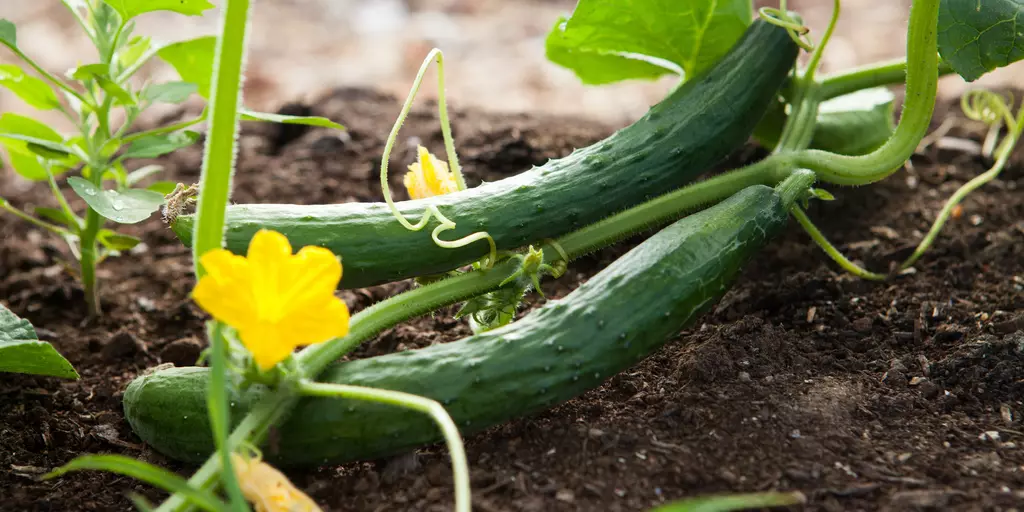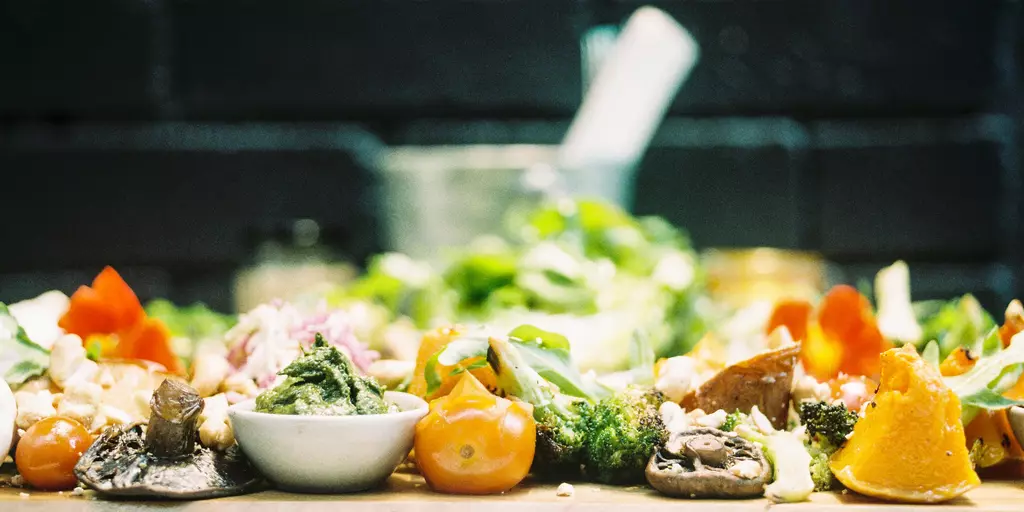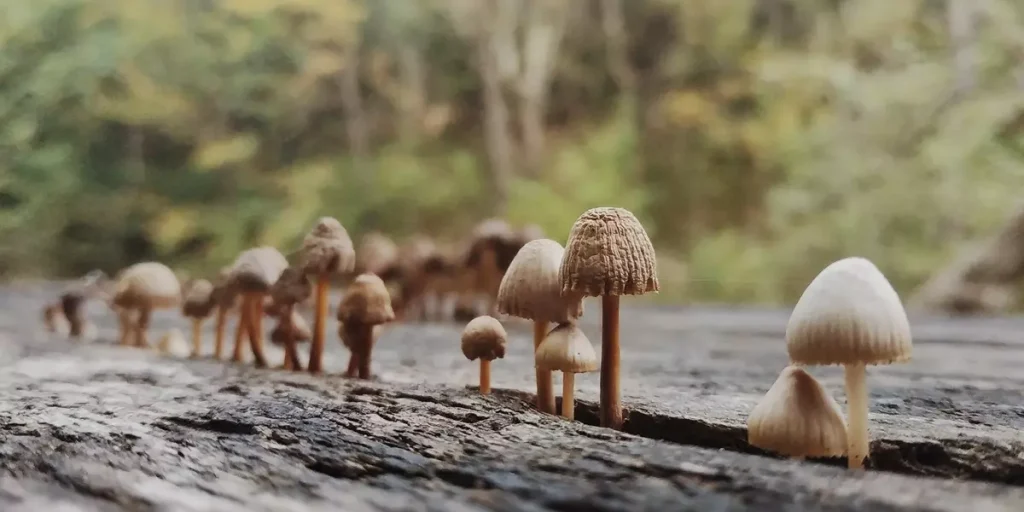
Composting has significant environmental benefits. But there are also disadvantages of composting that you’ll need to overcome to hit pay dirt.
In this post we’ll cover some of the basics you need to start composting. We’ll also share some of the dirty little secrets of composting, plus we’ll stop making terrible puns about dirt (well, probably).
What is Composting?
As you move through your day, more likely than not, you create food waste. In fact, it’s almost impossible to eat without ending up with some scraps leftover. You may have the peel of an orange or the stem of a vegetable on your counter after you cook breakfast. And that’s only one meal of your day!
Composting is important because it is basically nature’s recycling process (without any of the negative aspects of recycling). It allows you to dispose of these food scraps in a way that benefits the environment.
As the folks at New Mexico State put it, anything that used to be alive, both animal and plant sources, which contains carbon and/or nitrogen, can be broken down in a compost pile.
Composting is the process of harnessing decomposition to break down complex materials into their essential building blocks, building blocks that plants need to grow and be healthy. With the magic of composting, you recycle your food scraps and other organic waste into a fertilizer that can be used in soil.
Some people compost by collecting food scraps and storing them in your freezer to bring them to your city’s composting program. But not all local governments offer that option. If you live in a truly enlightened town or city, maybe its included as a curbside service.
You can also pay a company to collect your compost on a regular basis, like every week.
Or you can do it yourself. If you do it yourself, you’ll need some gear and knowledge to get started, but overall, composting is a simple process once you give it a try!
Why is Composting Good for the Environment?

Incorporating composting into your daily routine is a great way to live more sustainably since it has significant environmental benefits.
As people become more familiar with global warming, they often wonder what they can do to curb the effects of the climate crisis. Composting is a tangible, real step that every household can take to fight global warming.
Composting is listed as one of the top 100 solutions to global warming by Project Drawdown, a list of viable solutions the world can institute today to avoid a climate disaster.
Here’s how composting is an important step you can take to reduce your environmental footprint:
- Reduces Landfill Waste: Did you know that food scraps and garden waste make up 28% of what we throw away at home? On average, we estimate you can divert up to 600 pounds of waste from the landfill or incineration. By composting at home, you’re sending less waste to a landfill while making something that can be of use – nutrient rich soil!
- Revitalizes Soil and Enriches Plant Life : The process of composting creates vital nutrients that plants need such as nitrogen, phosphorous, and potassium. Many farms and gardeners use synthetic fertilizers which are full of chemicals and harmful ingredients that end up stripping nutrients from our food and sending toxic substances into our food sources. Compost can replace these fertilizers, which is a win for everyone!
- Cuts Methane Emissions: Many people don’t realize this, but organic waste decays differently than inorganic waste, so when the two are both sitting in a landfill together, methane gas and CO2 are created. Both of these emissions are harmful greenhouse gases, but methane is about 28-36 times more damaging in terms of trapping heat in the atmosphere, meaning it’s even worse than CO2, by a long shot. As a species, we need to do all we can to reduce methane created by humans, and landfills are the third-largest culprit of human methane generation.
- Conserves Water: When organic matter is added to soil, the soil’s ability to retain water increases. Producers then need less water to produce healthy crops. In the U.S., the agriculture industry can be thanked for about 80% of the country’s water usage. We have already seen the devastating effects draughts can have on communities and crop yield. Through composting, we are building a future that needs less water AND uses less water.
- Protecting Plant Health: Although less clearly understood than the other benefits above, scientists have found that adding compost to your soil actually protects plants and suppresses disease. Pretty cool!
Now you can see why composting is important for the Earth. But as we alluded to earlier, there are some easily surmountable but real disadvantages of composting.
Disadvantages of Composting

The power of composting is clear. If we all add it into our routine each day, we can have a massive impact and become a collective force for good. However, nothing comes without a cost. Composting isn’t all fun and games; it takes some work and has a learning curve. Here are some of the biggest disadvantages of composting:
- Requires Upfront Investment: If you’re composting at home, you’ll need to invest in a compost bin (read our recommendations for starter compost bins) and other equipment before you can get started. While this equipment has an upfront cost, if you’re using the compost in your own garden, these costs will be quickly covered by saving money on fertilizer. Additionally, the cost of a climate crisis is much more expensive than composting equipment, so it’s worth it in the long run!
- Can be Gross: Dealing with organic matter is dirty. Not only can it attract bugs and other pests, but it can also start to smell if not cared for properly. Some beginners even struggle with mold growing before they get the hang of composting. These are solvable issues and often dissipate once people learn how to properly compost at home.
- Some ways you can mitigate the grossness factor, is be more meticulous about what you put into your compost bin. No meats, dairy, or fats! Also, some organic material will take longer to breakdown, such as egg shells and avocado skins. You can choose to avoid these “ingredients” and throw them in the trash. You will then have mostly soil in your bin at the end of the season.
- Takes Time and Work: Your compost bin will need to be monitored, and the compost will need to be moved periodically, so it’s not an effortless endeavor. Just like incorporating other low-waste activities into your life, composting will be an adjustment. Once you’re used to it, it can fit nicely into your life and quickly become a part of your daily routine.
Good things take time and effort, and composting is no different. As you learn how to compost and what works best for you, there will likely be some growing pains. But we are confident you will enjoy and feel good about the environmental benefits of composting once you get rolling.
The Amazing Role of Fungus and Compost in Soil Health

When you add compost to your soil, you’re making it more attractive for fungus. Plants basically cannot live without underground fungus, called mycorrhizal fungi.
Tiny strands of mycorrhizal fungi run for the equivalent of miles and miles under the soil. This network basically delivers nutrients from the soil to the plants, nutrients they otherwise would be unable to access.
These fungi actually bind soil particles together into what is called aggregates, the crumbly soil all gardeners look for that plants love.
Soil structure, which is key to a healthy garden, is essentially brought about by healthy fungi network. So indirectly, feeding your fungi friends with fresh compost will keep all your plants happy and healthy.
Fun fact: As Merlin Sheldrake explains in his book Entangled Life, his fascinating deep dive of fungi (and deep dig for fungi), there are networks of fungi in the soil that are astronomical in size. If you were to measure the length of these fungal networks from the top 10 centimeters of soil of planet Earth, those strands of fungi would stretch almost half the length of our galaxy!
Does Compost Smell?
Yes, of course it does. You are conducting a chemical and biological experiment teeming with life, a veritable multi-tiered jungle of living beings that add up to the trillions, if you include bacteria. Just a gram of your compost can include literally billions of bacteria at any given moment. There will be smells.
But the human nose is an amazingly sensitive organ, so we have no one to blame but ourselves. Humans have the ability to differentiate between trillions of different odors!
Human noses can smell tiny concentrations of molecules. Sheldrake explains humans can pick up some smells with as little as 34,000 molecules in one cubic centimeter. That means you can smell the equivalent of a single drop of water in 20,000 Olympic swimming pools!

So I hate to be the one to break it to you, but you cannot compost without creating some odors. Even if you maintained the most perfectly balanced compost bin, odors are inevitable. But not all odors are created equal.
Professional composting facilities create odor wheels to classify all the smells they can and do produce. Smells are even classified using four separate criteria: detectability (can you smell it?), intensity (how smelly is it?), character (how would you describe it?), and hedonic tone (is it pleasant?).
Hedonic tone is obviously subjective, but bad smells are pretty much universally agreed upon. As they used to say about identifying pornography, “you know it when you see it” (or in this case, smell it). Taking a look at that odor wheel again, something tells me the hedonic tone of the “dead animal” and “sewery” odors are pretty noticeable, and nasty.
But don’t get freaked out, the good news is healthy compost actually produces a pleasant odor. Your compost bin is like a big ole’ science experiment, a pretty amazing one at that.
When you compost, your bin goes through a biological and chemical process that changes the ingredients and decomposes them, incrementally, into less complex compounds. During this transformation process, some compounds literally get vaporized, that is, turned into a gas, especially as the temperatures in the compost ramp up.
This vapor emanates from your compost bin and creates smells. You just have to keep things operating effectively and you’ll be fine, and it isn’t very complicated.
Make sure you focus on some basic steps – keep it balanced between green and browns, keep it moist but not soaked, and keep the air flowing by not allowing it to get matted down.
How Do I Keep Compost from Smelling?
When you keep your compost balanced it ensures a pleasant odor versus some of the terrible smells that can occur if things go awry.
The basic factors that you need to keep in mind when composting are:
- The amount of carbon rich material added, that is, the “browns”
- The amount of nitrogen rich material added, the “greens”
- The air circulating through your bin
- And finally, the amount of moisture in your compost bin
The optimal ratio of carbon rich or “brown” materials to nitrogen rich “green” materials for your compost bin is 30 to 1? That is by WEIGHT! Be mindful of adding too much “green” nitrogen rich sources. This includes all those veggie scraps you are adding day after day.
You can find carbon rich materials in surprising places though. If you have a sustainable dental routine, toss your bamboo toothbrushes, sans the bristles, into the compost. Try to break them up into smaller shards though.
It can be challenging to find 30 times more carbon rich materials. One option to consider is using all that carbon rich junk mail, newspaper, and cardboard that shows up on your door step each day. You need to shred it though, read here about doing it the right way. If you don’t, you end up with our next problem – air flow issues.
Keeping Your Compost Pile Breathing
Unless you are using an anaerobic composting method, such as the Bokashi method, then you need good air flow to compost.
If you throw a bunch of big chunks of cardboard, paper, or leaves into your bin without breaking them up you will run into air flow issues. Once a rain storm rolls through, it’ll soak those heavy paper materials, mat down your compost pile, and smother it. Without air, all your hard-working microscopic friends will die off.
You can increase air flow pretty easily. Grab a shovel and turn the pile every week or so. Or, if you have a compost tumbler, make sure you turn it occasionally (read our comparison of compost tumblers vs bins here).
Other options include adding bulking materials to the compost bin. When you add small sticks, pine cones, pine needles, and wood shavings throughout the weeks, you create pockets of space in which air can flow and feed all the oxygen-loving life forms chowing down in your pile.
Quench Your Compost’s Thirst
The last piece of the puzzle is moisture. You can be as anal or laid back when it comes to moisture in your compost bin as you’d like. If you live in a dry part of the world, you will likely need to add water, such as with a hose. But our experience is you’ll get ample moisture from rain and also the moisture released by fruits and vegetables.
When you add fruits and vegetables to the pile, there is a good amount of water trapped inside. As the compost cycle begins and they begin to break down, plant cell walls will break open and add moisture to your pile.
Your challenge will be too much moisture, most likely, versus not enough. Your goal is to keep the compost moist like a wrung out sponge, not dripping wet.
If you maintain your compost bin by focusing on these key factors, you will find that there is synergy between them. Need more carbon, add shredded paper or cardboard. This also will soak up excess water. Oh, and when you turn your pile to get more air, it also exposes moisture to air, drying it out. You also inevitably will mix some moist material into the hot center, evaporating moisture.
The bottom line with composting is, do not overthink it. Despite the science-y talk above, it is not that complicated. Nature has a way of balancing itself out. You can get away with minor interventions, like turning the pile, adding shredded paper, maybe a spray of a hose during a drought.
Does Composting Attract Rats?

When dealing with waste, especially organic waste, things can get gross. As discussed above, composting can bring about mold and smells that attract pests and animals. These smells can even attract rats because they tend to be drawn toward decaying organic matter, which is exactly what compost is!
Rodents will have a special love for your compost pile in the winter because it can offer them much-needed nutrients and provide warmth in the cold.
Here are some tips to handle this situation:
- You can talk to your neighbors, assuming you have some that compost, and ask if they have had any issues with rodents or rats in their compost bin. When we moved to a new house, we could have saved ourselves some trouble by asking. After rats started to sniffing around, our neighbors shared that they had invaded the previous owner’s compost too.
- You should avoid putting meat, bones, oils, dairy, and fats in your compost bin in general. If you ignore this advice, you’ll increase your chances of rodents visiting your back yard.
- Finally, if you really want to avoid vermin, get a compost container that is lifted off the ground, you’re much more likely to avoid issues with these pesky rodents! That said, our experience is that tumbler-style compost bins are less effective, require more attention, and are prone to stinky sludgy compost.
Progress is Progress
You’re not going to be the poster child of composting as soon as you start incorporating it into your household routine. However, it will also remind you how integrated natural processes are with one another and how the smallest efforts can have a major impact.
At the end of the day, it’s truly amazing how your kitchen waste and food scraps can help save the planet. And be turned into something you can use to nourish your garden!
The hardest part is getting started; once you take the plunge, you’ll be so happy you did – and the earth will be, too!
Here at R&R we only endorse products we have owned, tested, and fell in love with. If you end up making a purchase through one of our affiliate links, we may earn a very small commission that offsets a portion of the cost of hosting, building, and maintaining this site.